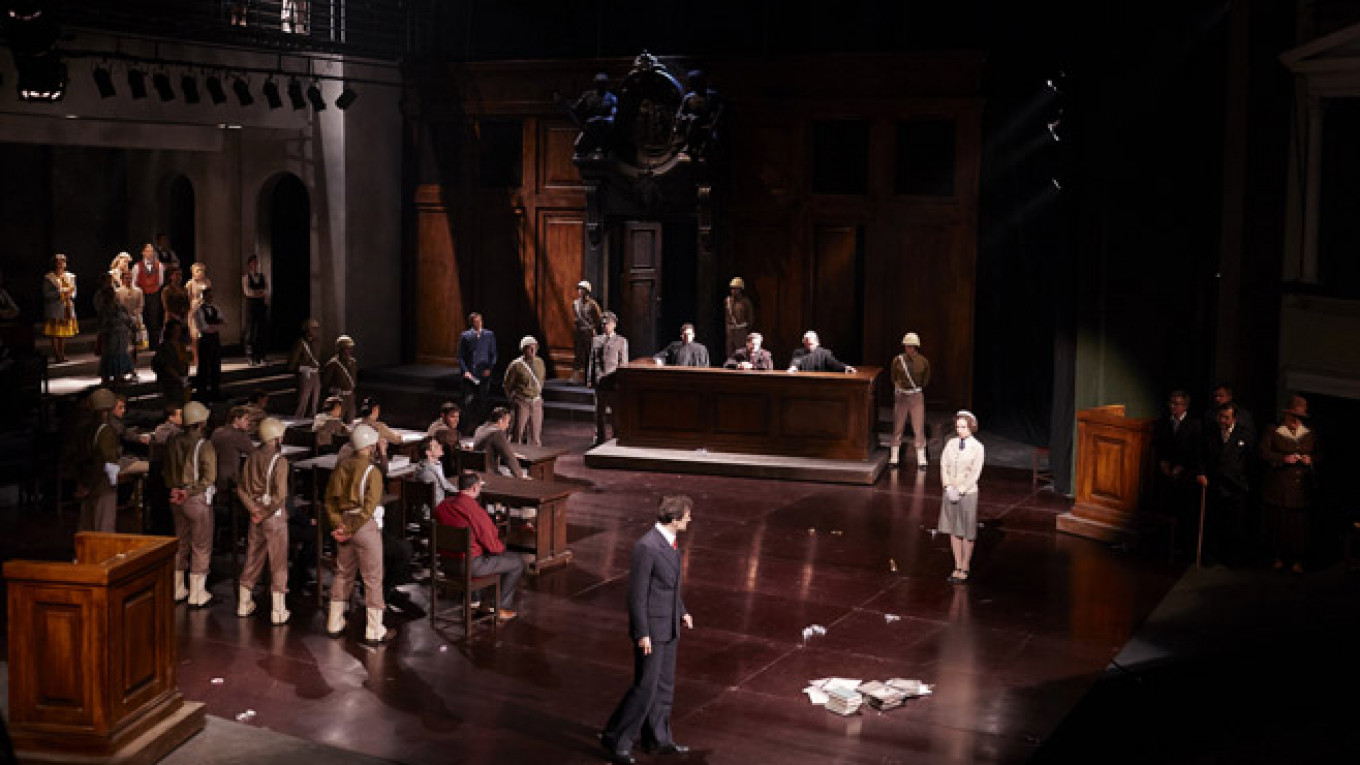More than any large, established theater in Moscow, the National Youth Theater has accepted the challenge in recent years of taking stock of history. Curiously, perhaps, I would argue that the stately, 700-seat venue's only rival in this mission is the feisty little 60-seat Teatr.doc, located, at least for now, in a basement a few kilometers away.
The Youth Theater's newest production, an adaptation of Abby Mann's classic screenplay for "Judgment at Nuremberg," under the simple title of "Nuremberg," is only one in a line of pieces mounted by artistic director Alexei Borodin with the purpose of asking hard questions. It follows the director's productions of "Rock 'n' Roll" and the "Coast of Utopia" trilogy, both by Tom Stoppard, as well as "Mourning Becomes Electra," Eugene O'Neill's drama of the American Civil War that Borodin used in order to explore themes that are not alien to the Russian tradition.
For good measure Borodin's stage also still hosts a brilliant production of the Holocaust-era tale, "A Stalemate Lasts But a Moment," directed by Mindaugas Karbauskis.
Every one of these productions asks spectators to try on uncomfortable roles, and demands that they face awkward questions about their country's, and perhaps their own or their own family's, past. Each seeks to define where modern society stands today, and to consider how and why it turned out this way.
In "Nuremberg," which tells the tale of the trials of accused German war criminals after World War II, Borodin took liberties and ran risks.
Instead of setting the action in a courtroom, Borodin set it in a restaurant where cabaret shows occasionally stop the action to entertain the public. Instead of incorporating formal interrogations and cross-examinations, as would be conducted at any trial, "Nuremberg" primarily consists of private conversations on which others in the room occasionally eavesdrop.
The intake of alcohol is no small factor in the characters' often buoyant moods. Designer Stanislav Benediktov made the restaurant bar one of the most prominent aspects of his elegant, realistic design.
The songs, dances and tipsy talk undercut the seriousness of the proceedings — something Borodin clearly intended to do. He created a fun-looking show that is calibrated to sneak up on the unsuspecting spectator. In the end, that definitely happens. But before we reach those few powerful moments when the performance is galloping headlong toward its culmination, we must struggle through some slow and seemingly inconsequential scenes.
The image of carefree killers chatting it up and laughing it off can be confusing and underwhelming at first. The same goes for the way most everybody ignores those charged with getting to the bottom of what transpired in German society. Everything at this point in the performance seems small and trivial.
There is a strategy to this. When we see the head prosecutor Dan Haywood (Alexander Grishin) pressured by his American superiors to find everyone innocent so as not to offend German society, we realize this is a story no one on any side really wants to tell.
And when the defendant Dr. Ernst Janning (Ilya Isayev), a respected German lawyer, breaks with his colleagues and accepts blame for his crimes — again, no one wants to hear what he has to say.
Borodin leaves it to the spectator — who, perhaps, has been as lax as anyone in following the details of the arguments — to refocus and to take a moral stand. The director provides an often lighthearted, moderately entertaining set of circumstances in which the spectator, much more so than most of the characters, begins to see a serious tale that has serious consequences.
Everybody laughs at the drunken Rudolph Petersen (Taras Yepifantsev), who was castrated by German doctors. After a while, we don't. Few are worried about the execution of an old Jewish man who was accused of having sex with the Aryan Irene Hoffman (Darya Semyonova). But the less anyone else cares, the more we tend to.
Borodin, in this relatively short, one-act performance, posed a host of troublesome questions, ranging from a country's blind obedience to an out-of-control leader to one's preconceptions about patriotism and traitors. By the end of the show most people in the hall are struggling to find the necessary answers on their own.
"Nuremberg" (Nurnberg) plays Thursday and Dec. 12 and 26 at 7 p.m. at the National Youth Theater, located at 2 Teatralnaya Ploshchad. Metro Teatralnaya. 495-692-0069, ramt.ru. Running time: 2 hours, 15 minutes.
Contact the author at artsreporter@imedia.ru
A Message from The Moscow Times:
Dear readers,
We are facing unprecedented challenges. Russia's Prosecutor General's Office has designated The Moscow Times as an "undesirable" organization, criminalizing our work and putting our staff at risk of prosecution. This follows our earlier unjust labeling as a "foreign agent."
These actions are direct attempts to silence independent journalism in Russia. The authorities claim our work "discredits the decisions of the Russian leadership." We see things differently: we strive to provide accurate, unbiased reporting on Russia.
We, the journalists of The Moscow Times, refuse to be silenced. But to continue our work, we need your help.
Your support, no matter how small, makes a world of difference. If you can, please support us monthly starting from just $2. It's quick to set up, and every contribution makes a significant impact.
By supporting The Moscow Times, you're defending open, independent journalism in the face of repression. Thank you for standing with us.
Remind me later.







